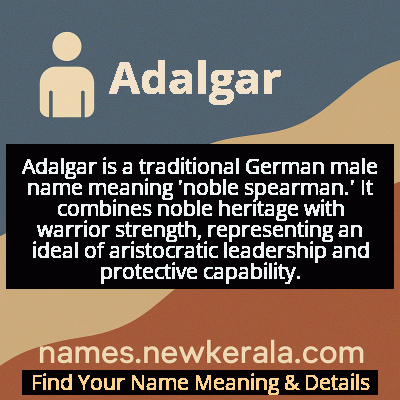Adalgar Name Meaning & Details
Origin, Popularity, Numerology Analysis & Name Meaning of Adalgar
Discover the origin, meaning, and cultural significance of the name ADALGAR. Delve into its historical roots and explore the lasting impact it has had on communities and traditions.
Name
Adalgar
Gender
Male
Origin
German
Lucky Number
8
Meaning of the Name - Adalgar
Adalgar is a traditional German male name meaning 'noble spearman.' It combines noble heritage with warrior strength, representing an ideal of aristocratic leadership and protective capability.
Adalgar - Complete Numerology Analysis
Your Numerology Number
Based on Pythagorean Numerology System
Ruling Planet
Saturn
Positive Nature
Ambitious, efficient, realistic, and authoritative.
Negative Traits
Materialistic, stressed, confrontational, and can be overly ambitious.
Lucky Colours
Dark blue, black.
Lucky Days
Saturday.
Lucky Stones
Blue sapphire, amethyst.
Harmony Numbers
2, 4, 6.
Best Suited Professions
Business leaders, managers, financial services, law enforcement.
What People Like About You
Leadership, determination, organizational skills.
Famous People Named Adalgar
Saint Adalgar
Archbishop and Saint
Archbishop of Hamburg-Bremen who played a crucial role in Christianizing Scandinavia
Adalgar of Corvey
Benedictine monk and scholar
Important religious figure and writer during the Carolingian Renaissance
Adalgar of Fulda
Monk and chronicler
Recorded important historical events in the Frankish Empire
Name Variations & International Equivalents
Click on blue names to explore their detailed meanings. Gray names with will be available soon.
Cultural & Historical Significance
The name represents a bridge between pagan Germanic warrior culture and the emerging Christian feudal society of medieval Europe. Many historical Adalgars served as bishops and missionaries, using their noble status and leadership skills to advance Christian causes. This dual heritage makes the name significant in understanding the transition from tribal Germanic societies to the organized states of medieval Europe, where noble birth and military capability remained important but were increasingly channeled through religious and administrative structures.
Extended Personality Analysis
Individuals named Adalgar are typically perceived as possessing strong leadership qualities, integrity, and a sense of duty. They often exhibit a combination of intellectual depth and practical capability, making them effective in both strategic planning and decisive action. Their noble bearing is complemented by a protective nature, often taking on roles where they can guide and defend others.
While they may appear reserved initially, they demonstrate fierce loyalty to those they care about and principles they believe in. This combination of thoughtful deliberation and courageous action makes them natural leaders in challenging situations. They tend to be traditional in their values but innovative in their approaches to problem-solving. The name suggests someone who balances wisdom with action, making decisions carefully but implementing them with determination and strength of character.
Modern Usage & Popularity
Adalgar remains a rare but respected name in modern German-speaking countries, primarily used by families with strong historical or regional connections. While it never achieved widespread popularity, it has seen occasional revivals among parents seeking traditional Germanic names with noble connotations. The name is more commonly found in historical reenactment communities and among families with aristocratic backgrounds. In recent years, there has been a slight increase in usage as part of the broader trend toward reviving medieval and traditional names, though it remains outside the top 1000 names in most German-speaking regions. Its rarity gives it a distinctive quality that appeals to parents looking for unique yet historically significant names.
Symbolic & Spiritual Meanings
Symbolically, Adalgar represents the ideal of noble leadership combined with protective strength. The spear element symbolizes both defense and the ability to take decisive action when necessary, while the noble component represents moral integrity and high principles. The name embodies the concept of the philosopher-warrior – someone who combines thoughtful wisdom with the courage to act on their convictions. In a broader sense, it symbolizes the balance between aristocratic responsibility and martial capability, making it emblematic of traditional Germanic values of honor, loyalty, and protective leadership that guided both secular rulers and religious leaders in medieval Europe.

